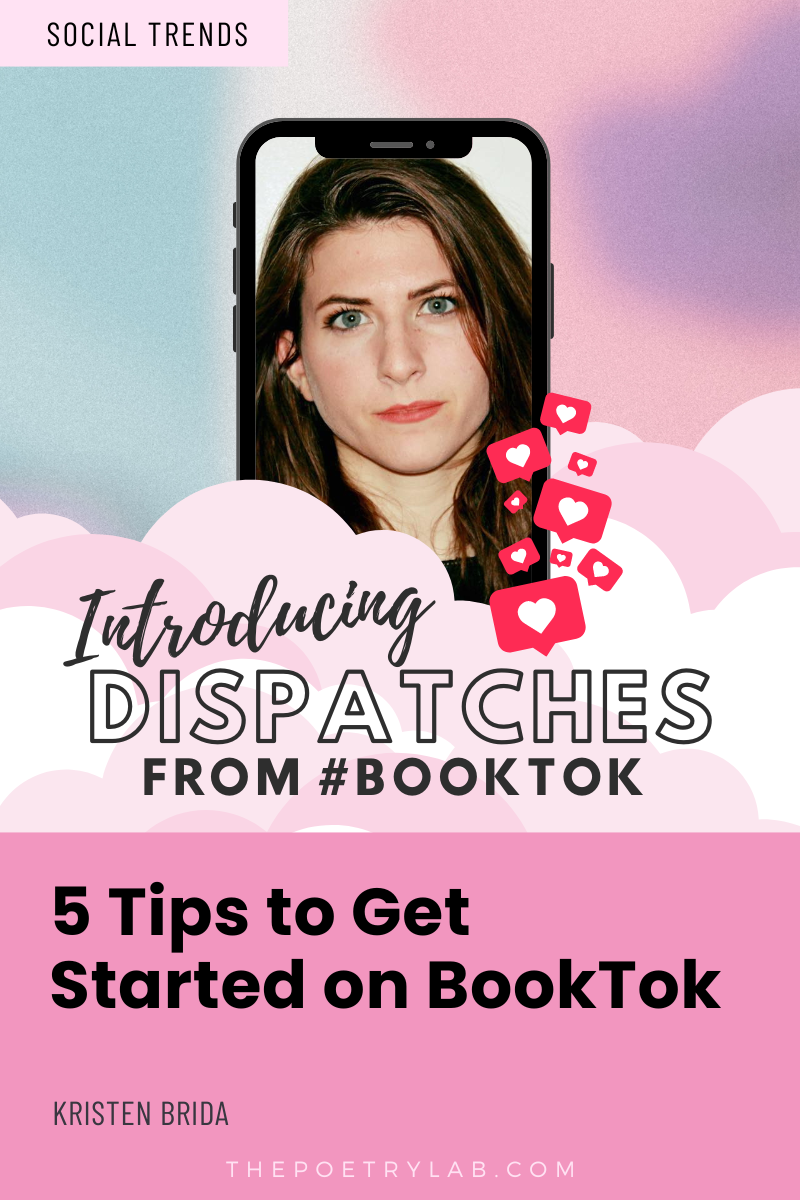Introducing Dispatches from BookTok + 5 Tips to Get Started!
It seems like every other month, someone writes a “think piece” about how BookTok is a scourge on the literary and publishing scene. Who could forget the Stephanie Danler article, where she questions why her TikTok didn’t take off despite finding lots of success on Instagram; or the GQ article that erroneously declares that BookTokers find, “being a reader is more important than actually reading”?
I can’t help but roll my eyes at essays like these. One paragraph in and I can already tell from their myopic perspective and recycled talking points that these writers spent maybe a week on BookTok before writing it off completely.
Finding Community on BookTok
Readers and writers alike will declare that they cannot find community on BookTok because their reading preferences are simply too niche and specific. Danler, who I mentioned earlier, laments the “performative nature” of BookTok—that users are more interested in performing the role of a BookToker that reads Clarice Lispector than actually discussing the existentialism in The Passion According to G.H.
I’ve been on BookTok since 2022, and in that time have amassed over 4,200 followers and over 58,000 likes. And no, I don’t post content on romantasy or “upmarket fiction.” I create videos recommending hidden literary fiction (I actually have several videos reviewing Danler’s books and my favorite author, Clarice Lispector) and showing that poetry is for everyone by recommending literary poetry for “beginners” and providing tips on how to approach and read poetry.
Like every community, whether digital or in-real-life, BookTok is beautifully multifaceted. It is true that a large portion of BookTok videos feature commercially popular authors such as Colleen Hoover and Sarah J. Maas.
However, BookTokers with a more “literary” sensibility are not as uncommon as people think. Like how at the local Barnes & Noble there might be fewer books by Anne Carson on the shelf than Sarah J. Maas, but that doesn’t mean there aren’t readers out there with poetic and literary tastes.
Finding community requires a level of self-curation—a deep knowledge of your reasons for seeking literary kinship, as well as insight into what you hope to contribute and gain from your involvement. This actively brushes up against how we’re supposed to use TikTok. We’re told to endlessly scroll our feeds, liking and skipping content until the algorithm guesses our tastes.
All this to say, if you are just depending on an algorithm, a useful but incomplete system for discovering digital communities, you are setting yourself up for failure in finding literary peers.
As someone who’s part of both the BookTok and the literary community, I feel it’s my responsibility to act as a bridge and shed some light on the inner workings of this community and the issues that are most pressing to our digital literary space. Every other month, I’ll share with you my insights, experiences, and critiques of BookTok as a literary influencer.
Tips for Getting Started on BookTok
Since I’ve mentioned how it is often misused by users and creators alike, I’d like to share with you five tips for getting started on BookTok. Most of these tips will be geared towards creating TikToks, but a few of them can also be helpful for users.
1. Stop relying on the algorithm so much.
I know I mentioned this earlier, but yes, it is that important. We tend to revere the algorithm as this all-knowing, godlike entity that, through complex equations, can determine everything about ourselves and, in return, generate content exactly to our tastes.
While an algorithm can be useful in helping you in finding videos, it should not be your only avenue for finding content and community.
How can you stop relying on the algorithm so much? It can be as simple as using the search function. I recommend brainstorming all of your favorite authors and books and typing them into the search bar. I guarantee you that no matter how eclectic your tastes are, there are at least a few BookTokers who share part of your literary sensibilities.
2. For creators—variety is important!
I want to talk more about Danler’s TikTok videos and why I think they did not “perform well.” Many of Danler’s videos feel very much like the content she rails against in her Bustle article, featuring 30-second clips of her reading a Shirley Hazzard book or sharing “writing tips”—for example, tip #3 is, “Writing is 70% Stealing from Poets”—behind a colorful bookshelf. These videos may be useful in showing your audience your taste and sense of humor, but if these are your only videos, you’re not providing much value to your audience.
TikTok is a digital space prime for content that generates either dialogue or learning. Performing a reading of Anne Carson is a passive way of using the app. These videos merely try to attract an audience by reinforcing literary tastes, rather than actually initiating thoughtful conversations.
This isn’t to say there's not a place for these quick clips that hint at your personality or sensibility as a reader or writer. I think creating these videos sparingly can be a tool for reeling in an audience. Since shorter videos tend to receive more views, it can also be a good way to circulate yourself and lead people to your page.
The key here is texture—you can occasionally create quick clips that land you on people’s For You Page. This will lead them to your profile where they’ll find more meaningful and in-depth videos that discuss your favorite poetry books or share the latest news in our literary world.
3. Think to yourself: what kinds of videos do I want to watch or what kind of videos do I want to see more of?
While there are content creators whose videos are more aesthetically-driven, there are plenty of BookTokers who find success in discussion-centric videos. This is especially true for the literary side of BookTok, where people want less surface-level videos, and more thought- and discussion-provoking ones.
In order to create videos like this, it’s important to ask yourself what you hope to gain or share with the BookTok community. Is there something on BookTok you want to see more of? Is there discourse on a topic you can provide valuable insight on? Once you’ve brainstormed, you can then begin breaking down your answers into ideas for videos.
For instance, when I first started my BookTok, I asked myself what I wanted more of on the app. I knew I wanted to show my audience that poetry is for everyone and how we’re often incorrectly taught that to enjoy and understand a poem, we must “decode” it. With these two ideas in mind, many of my videos center on recommending poetry books, sharing my favorite poems, and showing my audience how I like to approach a poem.
If you want to create a BookTok to promote your writing or your book, go for it. I strongly encourage also creating content that actively engages with readers. BookTokers can sniff a user’s promotional ploys a mile away, so again, variety will not only benefit your page views-wise, it will also make you look like a BookToker who genuinely wants to be a part of the community.
4. Follow your favorite small presses and literary outlets.
Yes, there are a bunch of small presses on TikTok! This migration to the app has ramped up over the last year or so, and I think it shows the increasing value and literary diversity of BookTok. It’s so exciting to see small presses and bookish outlets joining TikTok—it makes my little literary heart so happy.
Some of my favorite small presses and organizations to follow include: Graywolf Press, LitHub, Tertulia, Vignette Books, River River Books, FENCE, So Textual, and World Poetry Books—just to name a few.
5. Follow some of my favorite BookTokers!
There are so many incredible BookTokers out there, but here are some of my favorites that create at least some poetry content!
@ebonykenae
@brittanyvwilder
@alyssawitbeck
@aaronnovik
@natalkaburian
@leighstein
and @asiasbooks
I hope these tips help you find your community on BookTok—it’s truly an inspiring and dimensional community.
Tune in August for more of my dispatches from BookTok and be sure to follow me in the meantime @booksby_kb.
This article was published on June 6, 2024. Written by:




